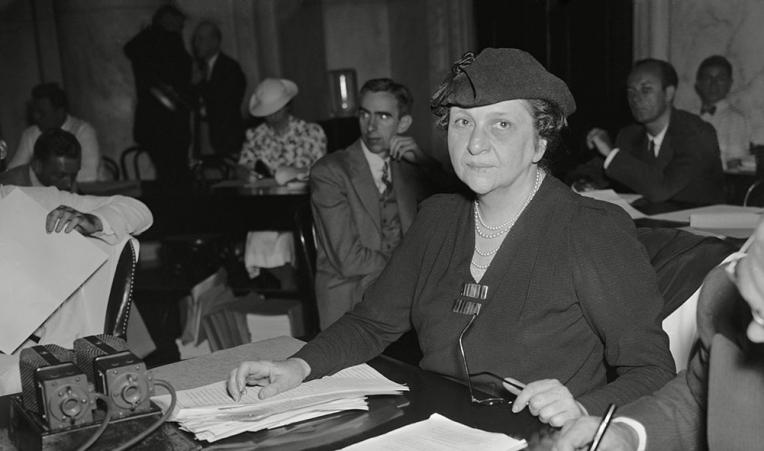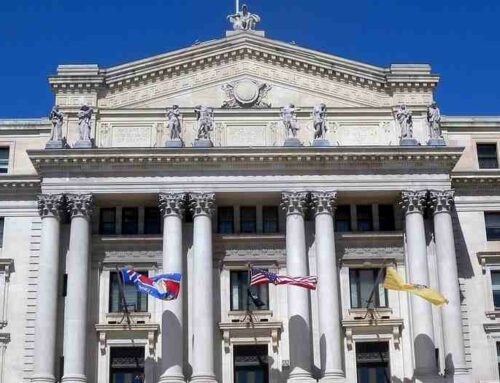Today, the United States Department of Labor (DOL) is a behemoth, addressing a wide range of issues in the vast field of “labor.” From its founding in 1913 as an immigration and welfare agency by a reluctant federal government, it has grown into one of the principal regulatory and human resources agencies of the federal government. The services range from enforcing wage and hour laws and anti-discrimination laws, to compiling the essential labor statistics that guide government policy. You can call the DOL at 866-487-2365 with any type of general inquiry. For more specific inquiries, you may call any of these agencies within the DOL.
Many workers today are unaware of the extraordinary woman who shaped the DOL in its critical years of growth and development. As we continue the fight for workers’ rights in the 21st Century, let’s take a moment to remember this extraordinary person, her many accomplishments, and the legacy she created.
Frances Perkins was well-born, raised and educated in Massachusetts in the late 1800’s. Brought up in a strict Republican household, she was taught that poverty was the result of laziness or alcoholism, and not the concern of proper young women. An economics course at her college and field visits to fabric mills to observe the working conditions there opened her eyes and gave her a purpose in life. She wrote her master’s thesis on the effects of malnutrition on poor New York City children.
After working in Chicago at the famed settlement house, Hull House, and in Philadelphia with a program to assist young immigrant women, Ms. Perkins went to New York and became involved in the women’s suffrage movement and the fight for humane working conditions. Incredibly, she was an eyewitness to the Triangle Shirtwaist factory fire, which killed 146 workers and became a rallying point for safer working conditions. Ms. Perkins famously said of that preventable tragedy, “It was the day the New Deal was born.”
Ms. Perkins became involved in New York state government, working tirelessly for worker’s rights, and along the way met Franklin D. Roosevelt. In 1933 the newly-elected President Roosevelt appointed Frances Perkins as Secretary of Labor, the first woman ever to serve in a presidential Cabinet. Among her many firsts and accomplishments are:
- Longest-serving Secretary of the DOL (1933-45).
- Survived a politically motivated impeachment attempt over her refusal to deport a Communist labor leader.
- Disbanded a special “alien deportation corps,” and ceased the department’s harassment of aliens.
- Set up the Civilian Conservation Corps, which sent young, unemployed men from the cities to work on conservation projects in rural areas at a dollar a day.
- Was a key figure in the enactment of Social Security (1935). She led a campaign to convince the nation that a pension system would be humanitarian and would help prevent future depressions.
- Led support for a law requiring firms with government contracts establish an 8-hour day and assure that the work would be done under safe conditions (1936). It also authorized the Secretary to set minimum wages based on locally prevailing rates.
- Worked tirelessly in favor of the Fair Labor Standards Act (1938). The Act set a national minimum wage and a maximum work week of 40 hours.
Before taking the position in 1933, Ms. Perkins asked President Roosevelt if he supported her goals of a 40-hour work week; a minimum wage; unemployment compensation; worker’s compensation; abolition of child labor; federal aid to the states for unemployment relief; Social Security; a revitalized federal employment service; and universal health insurance. The president said he did, and she took the job. Remarkably, she accomplished each of these goals, save the last.
Following her unparalleled service as Secretary of the Department of Labor, Ms. Perkins wrote a best-selling biography of President Roosevelt and continued teaching, speaking and leading the fight for fairness and safety for workers until her death in 1965.
Today, the DOL is an organization of over 15,000 people with a budget of $11 billion, with a mission the same as that of Frances Perkins – to improve all workers’ conditions and protect their rights.
If you ever call the Department of Labor, take a moment to remember Frances Perkins and the work she did on behalf of all of us.
If you ever should visit the Department of Labor headquarters in Washington, just ask your driver to take you to the Frances Perkins Building, at 200 Constitution Avenue NW.
And, if you have any questions about labor law, employment issues, unpaid wages, discrimination, or anything else related to the workplace, contact the professionals at Pelton Graham for a no-cost consultation by telephone, video conference or in person.
Frances Perkins in 1932. Bettmann/Getty Images











Leave A Comment